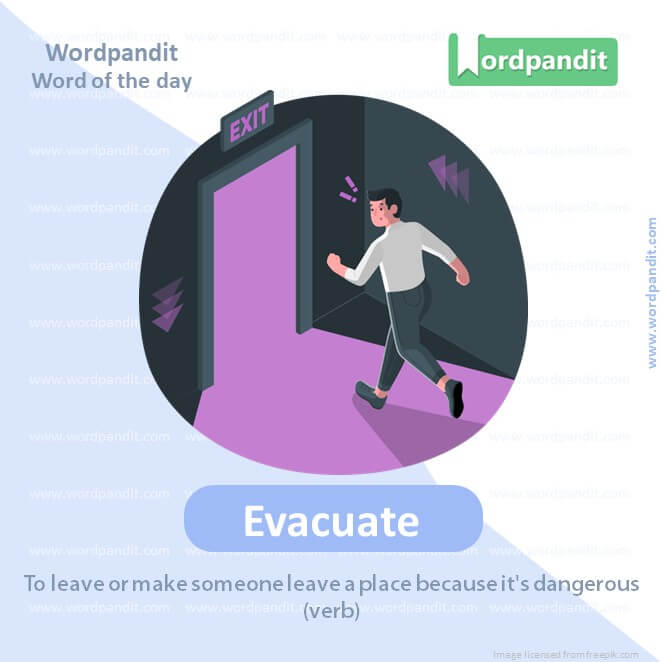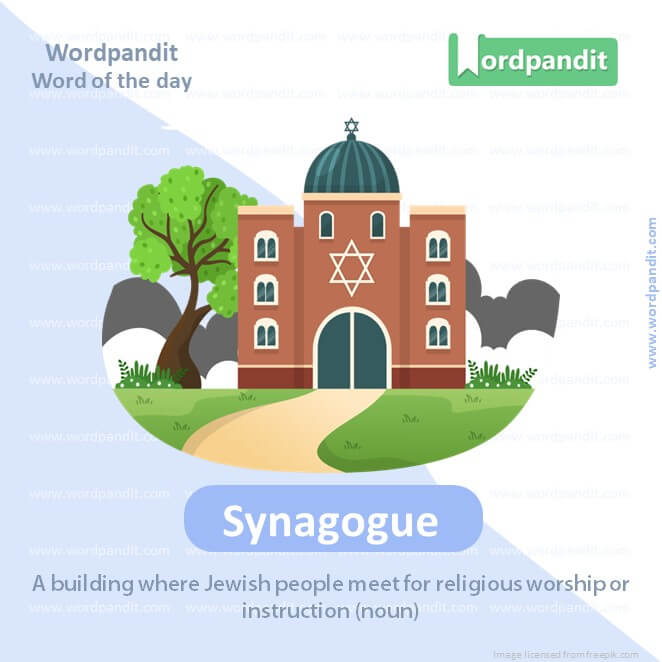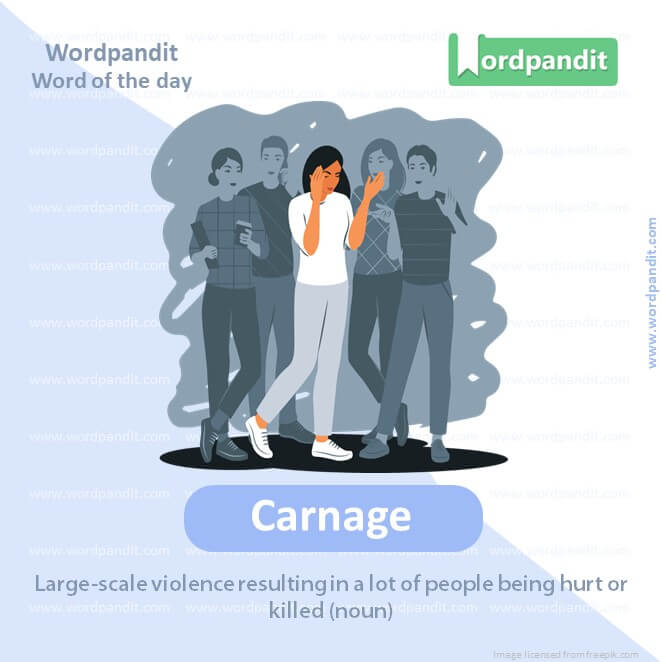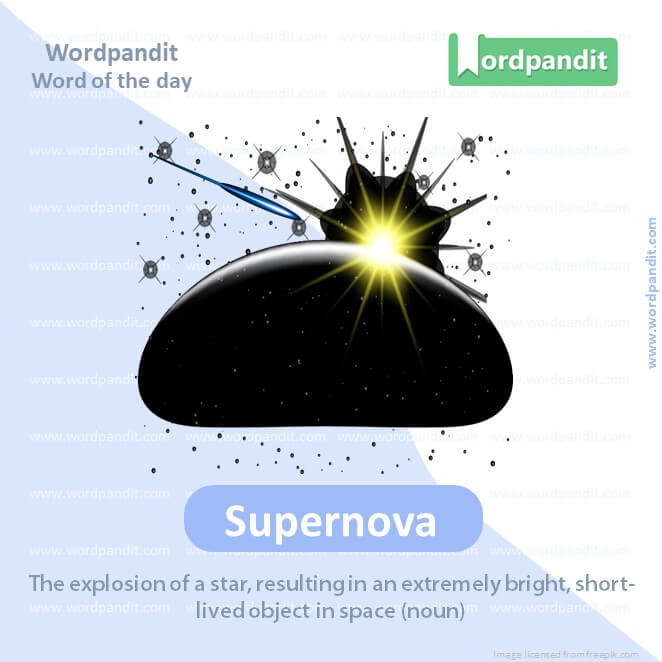Daily Vocabulary Words: List of Daily Used Words
Hi there. Welcome to this special section @ Wordpandit.
Our endeavour here is straightforward: highlighting important daily vocabulary words, you would encounter in The Hindu. This is your repository of commonly used words; essentially, we are posting a list of daily used words. Hence, this has significant practical application as it teaches you words that are commonly used in a leading publication such as The Hindu.
Visit the website daily to learn words from The Hindu.

WORD-1: Evacuate
CONTEXT: India is putting in place a major operation to evacuate its citizens who wish to return from conflict-hit Israel.
SOURCE: The Hindu
EXPLANATORY PARAGRAPH: Imagine there’s a big rainstorm coming and you need to leave your playhouse outside to stay safe inside your home. When you leave a place because it’s not safe, it’s called “evacuate.”
MEANING: To leave or make someone leave a place because it’s dangerous (verb).
PRONUNCIATION: ee-vak-yoo-ate
SYNONYMS: leave, exit, depart, withdraw, retreat, abandon, flee.
USAGE EXAMPLES:
1. The town had to evacuate because of the flood.
2. Firefighters helped to evacuate the building.
3. We were told to evacuate the area immediately.
4. The school practiced how to evacuate during emergencies.

WORD-2: Synagogue
CONTEXT: The night before, he had been singing and dancing with Torah scrolls amid a crowd of 200 strong at the Chabad community synagogue in his hometown of Sderot, located less than 1 km from Beit Hanun.
SOURCE: The Hindu
EXPLANATORY PARAGRAPH: A synagogue is like a special house where Jewish people go to pray, learn, and be together. It’s like some people go to churches or temples; Jewish friends go to a “synagogue.”
MEANING: A building where Jewish people meet for religious worship or instruction (noun).
PRONUNCIATION: sin-uh-gog
SYNONYMS: temple, shul, house of worship, meeting house, congregation, tabernacle, place of prayer.
USAGE EXAMPLES:
1. The family attended the synagogue every Saturday.
2. The synagogue was beautifully decorated for the festival.
3. He studied for his Bar Mitzvah at the local synagogue.
4. They donated books to the synagogue’s library.

WORD-3: Impenetrable
CONTEXT: Top military brass stated time and again the fence was impenetrable and that an attack like this was the stuff of fantasy.
SOURCE: The Hindu
EXPLANATORY PARAGRAPH: Think of a big, strong wall that you can’t see through, climb, or break. If something is super strong and cannot be passed or understood, we say it’s “impenetrable.”
MEANING: Impossible to pass through or see through; impossible to understand (adjective).
PRONUNCIATION: im-pen-i-truh-bul
SYNONYMS: unbreakable, dense, thick, solid, indecipherable, unfathomable, inscrutable.
USAGE EXAMPLES:
1. The jungle was dense and impenetrable.
2. The mystery remained impenetrable to the detectives.
3. The old castle had impenetrable walls.
4. The fog was so thick it seemed impenetrable.

WORD-4: Carnage
CONTEXT: As of Wednesday morning, official reports are slowly coming out about the carnage that ensued.
SOURCE: The Hindu
EXPLANATORY PARAGRAPH: Imagine seeing lots of broken toys and game pieces all over your playroom after a big pretend battle. “Carnage” means a lot of destruction, harm, or damage, usually where people get hurt.
MEANING: Large-scale violence resulting in a lot of people being hurt or killed (noun).
PRONUNCIATION: kar-nij
SYNONYMS: slaughter, massacre, destruction, bloodshed, havoc, ruin, annihilation.
USAGE EXAMPLES:
1. The battlefield was a scene of complete carnage.
2. The hurricane left carnage in its wake.
3. The movie depicted the carnage of war.
4. News reports showed the carnage from the explosion.

WORD-5: Supernova
CONTEXT: Popular Palestinian Telegram channels such as “Gaza Now in Arabic” proudly display the gunfights, executions, mutilation of bodies, captivity of young women, and the events of the massacre at the supernova rave party at Re’im Forest.
SOURCE: The Hindu
EXPLANATORY PARAGRAPH: In the big sky above, stars are like giant light bulbs. Sometimes, a star explodes and becomes very, very bright for a little while. This bright explosion of a star is called a “supernova.”
MEANING: The explosion of a star, resulting in an extremely bright, short-lived object in space (noun).
PRONUNCIATION: soo-per-noh-vuh
SYNONYMS: starburst, stellar explosion, nova, flare-up, brightness, luminary, burst.
USAGE EXAMPLES:
1. Scientists observed a supernova in a distant galaxy.
2. The supernova was brighter than all the other stars.
3. Studying supernovas helps astronomers understand the universe.
4. A supernova is a spectacular cosmic event.
WORD-6: Massacre
CONTEXT: Popular Palestinian Telegram channels such as “Gaza Now in Arabic” proudly display the gunfights, executions, mutilation of bodies, captivity of young women, and the events of the massacre at the supernova rave party at Re’im Forest.
SOURCE: The Hindu
EXPLANATORY PARAGRAPH: Imagine if a big group of toy soldiers were playing and suddenly, most of them got knocked over and couldn’t get up again. That’s a little like a “massacre.” It’s when a lot of people or animals get hurt very badly, usually all at once.
MEANING: A cruel killing of a large number of people or animals, typically at the same time (noun).
PRONUNCIATION: mas-uh-ker
SYNONYMS: slaughter, bloodbath, annihilation, carnage, butchery, extermination, pogrom.
USAGE EXAMPLES:
1. The history book spoke about the massacre that happened years ago.
2. The invading army was responsible for the village massacre.
3. The predator’s massacre of the smaller animals left the forest in shock.
4. There was outrage across the country after the massacre.
WORD-7: Mourn
CONTEXT: Friends mourn Tamar Kedem of Nir Oz, murdered along with her husband and three daughters.
SOURCE: The Hindu
EXPLANATORY PARAGRAPH: When you lose a toy or something special, you might feel really sad and miss it a lot. When people feel this way about someone they’ve lost, they “mourn.” It means they are very sad and miss someone who is no longer with them.
MEANING: To feel or show great sadness because of someone’s death (verb).
PRONUNCIATION: morn
SYNONYMS: grieve, lament, sorrow, wail, weep, bemoan, rue.
USAGE EXAMPLES:
1. The entire nation mourned the loss of the beloved leader.
2. She took a few days off to mourn her grandfather.
3. The community came together to mourn and remember the victims.
4. It’s natural to mourn the loss of a close friend.
WORD-8: Fortifications
CONTEXT: The fortifications proved too strong, and as casualties mounted among the special forces, a tank was brought in to topple the building.
SOURCE: The Hindu
EXPLANATORY PARAGRAPH: Imagine building a big wall or moat around your toy castle to keep it safe from toy dragons or knights. Those walls or protective things you build are like “fortifications.” They are made to protect places.
MEANING: Structures or barriers built to protect and defend a place (noun).
PRONUNCIATION: for-ti-fi-kay-shuns
SYNONYMS: defenses, walls, ramparts, barriers, bulwarks, battlements, palisades.
USAGE EXAMPLES:
1. The ancient city had impressive fortifications.
2. Soldiers were stationed at the fortifications to guard the kingdom.
3. They strengthened the fortifications in preparation for an attack.
4. The castle’s fortifications have stood the test of time.
WORD-9: Demolished
CONTEXT: The burnt police station was demolished on Monday morning, amid a deathly silence on the empty streets.
SOURCE: The Hindu
EXPLANATORY PARAGRAPH: Imagine building a tall tower with your building blocks and then knocking it down with your hand. When something is broken down or destroyed like that, we say it’s “demolished.”
MEANING: Completely destroyed or torn down (verb).
PRONUNCIATION: deh-mol-ished
SYNONYMS: destroyed, razed, wrecked, shattered, obliterated, ruined, annihilated.
USAGE EXAMPLES:
1. The old building was demolished to make way for a new mall.
2. The hurricane demolished several coastal homes.
3. They demolished the cake in minutes.
4. Plans to demolish the historic site were met with protests.
WORD-10: Munition
CONTEXT: They are pounded by round after round of munitions delivered by Israel Air Force and Navy. Shaati and Jebaliyya Refugee camps were also targeted.
SOURCE: The Hindu
EXPLANATORY PARAGRAPH: You know how superheroes have special tools and gadgets to fight the bad guys? In real life, armies have things called “munitions.” These are like tools, mostly weapons and ammo, used to protect and defend.
MEANING: Military weapons, ammunition, and equipment used in warfare (noun).
PRONUNCIATION: myoo-nish-un
SYNONYMS: armament, weaponry, arms, arsenal, ordnance, ammo, equipment.
USAGE EXAMPLES:
1. The army depot stored munition for use in emergencies.
2. There was an explosion in the munition factory.
3. The soldiers checked their munition before the mission.
4. The treaty called for the destruction of all chemical munition.
Vocabulary
Language is a confluence of thoughts, emotions, and experiences that find vibrant expression through words. In this spectrum, ‘vocabulary’ shines as a critical aspect that shapes and directs our language proficiency. It offers depth, nuance, and clarity to our expressions. However, mastering ‘vocabulary’ is an art that requires a strategized approach.
An intensive strategy for learning ‘vocabulary’ goes beyond the limiting precincts of memorization. Instead, it nudges learners towards comprehension and application. To understand ‘vocabulary’, take a step forward from traditional textbooks and classroom sessions, and embrace the vast world of books, articles, podcasts or digital content in the language you are learning. This step allows you to understand words in context, see how they are used in different situations, and absorb words as part of the natural flow of language.
As you journey through ‘vocabulary’, remember that this expedition should not be a race. Rather, it’s a marathon where pacing yourself is pivotal to long-term success. Learning a few words each day and consolidating your knowledge through regular revision tends to be more effective, as it prevents cognitive overload and promotes solid retention.
Interactive learning tools can provide valuable support in assimilating ‘vocabulary’. Use of flashcards, language-learning apps, or memory-enhancing software can make this process more engaging and effective, reinforcing the ‘vocabulary’ in your memory.
Lastly, practice is an incontrovertible part of mastering ‘vocabulary’. Utilize the learnt vocabulary in your daily conversations, write-ups, or presentations to ensure an active application. Doing this fosters recall and cements understanding.
In summation, learning ‘vocabulary’ is a journey that should be embraced with an integrated approach, where understanding and application are the key elements. By engaging with diverse learning resources, pacing the learning process, employing interactive learning tools, and practicing regularly, the journey of mastering ‘vocabulary’ becomes a fulfilling and enriching experience.













